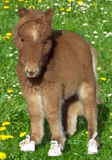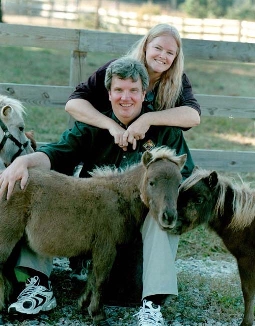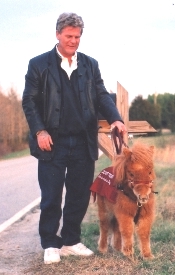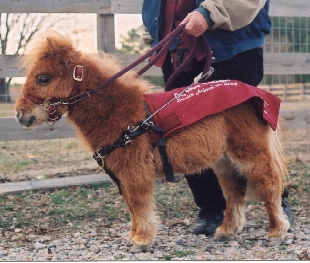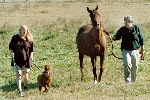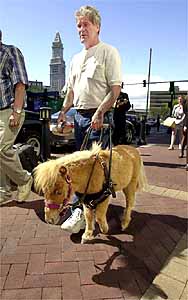|
|
Hendrick v. AshburnUNPUBLISHED
Summary of OpinionThe plaintiff Hendricks sent her miniature mare to the defendant veterinarian for treatment. While at the clinic, the horse died of colic. The trial court granted the vet's motion for summary judgment on the basis of the affidavits of veterinarians who had examined the medical records and determined that the vet had adhered to appropriate veterinary medicine standards. The plaintiff did not contravene those affidavits with veterinary affidavits of her own. The Court of Appeals held that on the basis of the affidavits submitted there was no question of fact to be tried. The plaintiffs failed to raise an issue whether the defendant was negligent in his treatment of the mare. Therefore, it affirmed the decision of the trial court. Text of OpinionThis is a summary judgment case. Zelwanda Hendrick and Betty McLain, individually and doing business as Adventure II Miniature Horses, initiated this suit in Cherokee County against Dr. L. Douglas Ashburn, a veterinarian doing business as Southwood Drive Animal Clinic, and against Don Burdette and Beverly Burdette, individually and doing business as Bar B Miniatures, Ray Zoercher, and Gary McMorrow. The original petition alleged deceptive trade practices, breach of implied warranty, negligence and gross negligence in connection with the boarding, training and veterinary treatment of the plaintiffs' miniature horse. The case was transferred from Cherokee County to Angelina County upon motions of the defendants. The trial court granted Dr. Ashburn's motion for summary judgment and severed that part of the suit. Hendrick and McLain raise eight points of error. Point of error one avers the trial court erred in granting Ashburn's motion for summary judgment. The movant for summary judgment has the burden of showing there is no genuine issue of material fact and that he is entitled to judgment as a matter of law. In deciding whether there is a material fact issue precluding summary judgment, evidence favorable to the non-movant is taken as true, and every reasonable inference must be indulged in favor of the non- movant. A defendant moving for summary judgment must conclusively disprove as a matter of law one or more elements essential to each of the plaintiffs' claims. The movant may establish his right to summary judgment on the uncontroverted estimony of an expert witness if the subject matter is such that the trier of fact would be guided solely by the opinion testimony of experts, so long as the evidence is clear, positive and direct, otherwise credible and free from contradictions and inconsistencies, and could have been readily controverted. The affidavit of an expert who is also an interested party to the case can support a summary judgment if it meets the requirements of Rule 166a(c). When the defendant has produced competent evidence to negate a necessary element of the plaintiffs' cause of action, then the plaintiffs must introduce evidence sufficient to raise a fact issue with respect to that element. To defeat a summary judgment, the nonmovant's controverting evidence need only raise an issue of fact with respect to the element or elements of the cause of action negated by movant's summary judgment evidence and need not meet the burden of persuasion imposed upon the nonmovant plaintiffs at trial. In a medical malpractice case, the plaintiff must prove at trial: 1) a duty by the health care provider to act according to a certain standard; 2) a breach of the applicable standard; 3) an injury; and 4) a reasonably close causal connection between the alleged breach of care and the injury. As a general rule, in a medical malpractice case proximate cause must be proven by expert medical testimony. The affidavit must state: 1) the physician's qualifications; 2) the services performed over the treatment period; 3) that the physician met the standard of care; 4) specific denials of each of the allegations of negligence contained in the petition; 5) that his opinion is based upon reasonable medical probability; and 6) that no act or omission on the physician's part caused any damage to the patient. The experts' affidavits entitle the movant to summary judgment unless the non-movants introduce competent expert medical evidence to raise a fact question on the issue. Unless the mode of treatment is a matter of common knowledge, the plaintiffs must raise a fact issue through competent expert medical testimony. A doctor of the same school of practice as the defendant must testify that the defendant's diagnosis or treatment was negligent and proximately caused the injury. Hart v. Van Zandt, 399 S.W.2d 791 (Tex.1965). We find no basis for distinguishing the rule applied in medical malpractice and in a case involving veterinary malpractice. Ashburn attached several affidavits to his motion for summary judgment. These affidavits were amended with leave of court. Dr. Ashburn's affidavit stated his professional background, detailed the course of treatment, described the standard of care and his adherence to that standard, denied the specific acts of negligence described in the petition, testified he correctly diagnosed and treated the horse, and stated that based upon reasonable veterinary/medical probability there was no causal connection between any act or omission on his part and the injury to the mare. He attached the medical history of his treatment of the mare, the necropsy report and addendum which stated that the horse succumbed to acute necrotizing enterocolitis/acute salmonellosis. The affidavit of John A. Wood, D.V.M., stated his professional experience, that he had reviewed the medical history and treatment of the animal, including the necropsy reports, and concluded in his opinion Dr. Ashburn acted in accordance with the appropriate standard of care. The affidavit of Gerald K. Carter, D.V.M., listed his professional experience, noted that he had reviewed the medical history and treatment records attached to the affidavit, and stated his opinion that Dr. Ashburn acted in accordance with the standard of care for a veterinarian, and that based upon medical/veterinary probability there was reflected in the records no improper act or omission on the part of Dr. Ashburn in the care, medication and treatment of the horse. Appellants filed no expert affidavit in response to the motion for summary judgment. They did submit the affidavit of Betty McLain, which stated: "Upon meeting with Mr. Zoercher that morning [May 25], he informed me that Loreli had experienced a mild colic on Thursday, May 24, 1990, but that she was okay and they had not left her at the veterinarian's overnight because it would have been a waste of money.... [L]ate in the afternoon of Sunday, May 27, 1990.... I was informed personally by Don Burdette ... that the mare, Sligo's Loreli, was quite ill, was at the veterinarian's clinic and that I should go there as quickly as possible.... When I arrived there, my horse was standing rigidly in an apparent state of shock and she was experiencing projectile diarrhea...." The affidavit further stated that Dr. Ashburn told her he had seen the horse on May 24 and sent her home because it was nothing serious, and that during this conversation no one suggested that the mare had remained overnight at the veterinary clinic. The affidavit of Jane Bret stated that she was an owner and breeder of miniature horses, that she was present during the conversation between McLain and Ashburn, that the doctor said she was impacted but she observed projectile diarrhea, that the doctor said he had seen the horse earlier that week and sent it home because it was fine, and that no one suggested that the horse had remained overnight at the clinic. Appellants argue that the affidavits of McLain and Bret place into dispute the factual bases for the veterinary opinions because they call into question the medical history and its factual contents. This medical history states that the horse was examined and released to Zoercher on May 24, but was readmitted that afternoon and remained at the clinic until the morning of May 26. The horse began experiencing diarrhea the evening of May 27. Appellants' position seems to rely upon the fact that 1) McLain was not told the horse was treated at the clinic overnight, and 2) on May 27 McLain and Bret noticed diarrhea although the doctor's May 24 entry stated he suspected the mare was impacted, and a rectal palpation performed May 27 noted a "slight enlargement at the pelvic flexure of the large colon." Thus, appellants argue, they have successfully undermined the factual bases for the veterinary opinions so the movant's evidence lost its probative value. We consider the evidence in the light most favorable to the non-movants. We accept the statements contained in the non-movants' affidavits as true. Thus, appellant established that they were not told that the horse was readmitted to the veterinary clinic, that they were told that the horse was fine on May 24, and the horse suffered from projectile diarrhea on May 27. This contradicts no factual statement contained in the movant's affidavits. There is nothing in the record to suggest that the horse was not admitted to the clinic, that it violated the standard of care to keep the horse overnight, that the veterinarian misdiagnosed the horse on May 24, or that there can be no impaction in the presence of diarrhea. Appellants did not present the court with expert testimony to address the proximate cause element. Ashburn established that no act or omission on his part was a proximate cause of the horse's demise. We find no trial court error. We affirm the judgment.
|
Guides Training Press Photos News Apply FAQ Volunteers Wishes Contact Home
Copyright © 1998, 1999, 2000, 2001, by the Guide Horse Foundation Inc.
Guide Horse ® is a registered trademark of the Guide Horse Foundation Inc.
The Guide Horse Foundation has the utmost respect for The Seeing Eye® and their seventy-two years of outstanding work with assistance animals for the blind. Please note that The Guide Horse Foundation is not affiliated with or sanctioned by the Seeing-Eye® or any of the Guide Dog training organizations. Seeing-Eye® is a registered trademark of the Seeing-Eye, Inc.
kegel exrcise device
